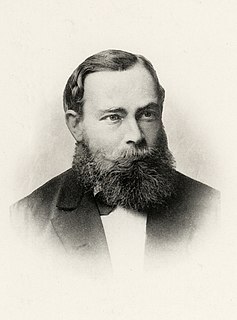Related Research Articles

Friedrich Ludwig Gottlob Frege was a German philosopher, logician, and mathematician. He worked as a mathematics professor at the University of Jena, and is understood by many to be the father of analytic philosophy, concentrating on the philosophy of language, logic, and mathematics. Though largely ignored during his lifetime, Giuseppe Peano (1858–1932) and Bertrand Russell (1872–1970) introduced his work to later generations of philosophers.

Ferdinand Lassalle was a Prussian-German jurist, philosopher, socialist and political activist best remembered as the initiator of national-style social democracy in Germany as well as for coining the terms night-watchman state and iron law of wages.

Johannes Stark was a German physicist who was awarded the Nobel Prize in Physics in 1919 "for his discovery of the Doppler effect in canal rays and the splitting of spectral lines in electric fields". This phenomenon is known as the Stark effect.

Joseph Hormayr, Baron zu Hortenburg was an Austrian and German statesman and historian.

Paul Lindau was a German dramatist and novelist.

Eduard von Martens also known as Carl or Karl Eduard von Martens, was a German zoologist.
The Dobrujan Germans were an ethnic German group, within the larger category of Black Sea Germans, for over one hundred years. German-speaking colonists entered the approximately 23,000 km² area of Dobruja around 1840 and left during the relocation of 1940. Dobruja is a historic territory on the west coast of the Black Sea.
Edgar Bauer was a German political philosopher and a member of the Young Hegelians. He was the younger brother of Bruno Bauer. According to Lawrence S. Stepelevich, Edgar Bauer was the most anarchistic of the Young Hegelians, and "...it is possible to discern, in the early writings of Edgar Bauer, the theoretical justification of political terrorism." German anarchists such as Max Nettlau and Gustav Landauer credited Edgar Bauer with founding the anarchist tradition in Germany. In the mid-1840s, Marx' and Engels' critique of the Bauer brothers marked the beginning of their collaboration and an important stage in the development of Marxist thought. Edgar Bauer participated in the Revolution of 1848. Subsequently he became a conservative.

Wilhelm Dunker, full name Wilhelm Bernhard Rudolph Hadrian Dunker was a German geologist, paleontologist and zoologist.
Adolph Lowe was a German sociologist and economist. His best known student was Robert Heilbroner. He was born in Stuttgart and died in Wolfenbüttel.
Heinrich Besseler was a German musicologist born in Hörde. He is particularly known for his colossal work, Die Musik des Mittelalters und der Renaissance (1931), which provided a new perspective on historical musicology by taking a history-of-ideas approach to music history.

Friedrich Wilhelm Schulz was a German officer, radical, and social democratic publisher in Hesse. His most famous works are Der Tod des Pfarrers Friedrich Ludwig Weidig as well as Die Bewegung der Produktion, which Karl Marx quoted extensively in his 1844 Manuscripts. Schulz was the first to describe the movement of society "as flowing from the contradiction between the forces of production and the mode of production," which would later form the basis of historical materialism. Marx continued to praise Schulz's work decades later when writing Das Kapital.

Friedrich Gottlob Schulze was a German economist.

Paul Kemp (1896–1953) was a German stage and film actor. Kemp worked as a piano accompaniest for silent films, and then served as an ambulance driver on the Western Front during the First World War. Post-war he moved into acting on the stage in Düsseldorf and Hamburg. His career really took off when he moved to Berlin in 1929, appearing in the hit stage version of the novel Menschen im Hotel by Vicki Baum. He made his film debut in 1930, shortly after the introduction of sound film. He appeared prolifically in German and Austrian films until his death in 1953.

BWV Anh., abbreviation of Bach-Werke-Verzeichnis Anhang, is a list of lost, doubtful and spurious compositions by, or once attributed to, Johann Sebastian Bach.
Hans Reinerth was a German archaeologist. He was a pioneer of Palynology and modern settlement archaeology, but is controversial because of his role before and during the period of National Socialism.
Hans-Joachim Schulze is a German musicologist, a Bach scholar who served as the director of the Bach Archive in Leipzig from 1992 to 2000. With Christoph Wolff, he was editor of the Bach-Jahrbuch from 1975 to 2000. He published an introduction to all cantatas by Johann Sebastian Bach in 2006.
Klaus Sator is a German grammar school teacher, political scientist, historian, author and Information manager.
Walther Hermann Vetter was a German musicologist. From 1946 to 1958 he was professor at the Humboldt University of Berlin.
References
- Schapiro; J. Salwyn; Liberalism and the Challenge of Fascism: Social Forces in England and France, 1815-1870, McGraw-Hill Book Company, Inc., NY, 1949. pg 368. OCLC 946369
| This article about a German writer or poet is a stub. You can help Wikipedia by expanding it. |